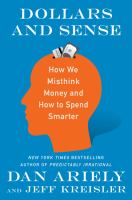Book Review: Dollars and Sense
Ariely, Dan, et al. Dollars and sense : how we misthink money and how to spend smarter. HarperCollinsPublishers, 2017.
 In Dollars and Sense: How We Misthink Money and How to Spend Smarter, Dan Ariely, bestselling author and James B. Duke Professor of Psychology and Behavioral Economics at Duke University, teams up with Jeff Kreisler, attorney, author and comedian, to examine our irrational thinking and behavior with respect to money. While written for a general audience, the book references numerous scholarly studies and provides complete notes to undergird the authors’ observations and analysis. It is divided into three sections: how we define money, how we (mis)-assess value, and how we can think more clearly about money.
In Dollars and Sense: How We Misthink Money and How to Spend Smarter, Dan Ariely, bestselling author and James B. Duke Professor of Psychology and Behavioral Economics at Duke University, teams up with Jeff Kreisler, attorney, author and comedian, to examine our irrational thinking and behavior with respect to money. While written for a general audience, the book references numerous scholarly studies and provides complete notes to undergird the authors’ observations and analysis. It is divided into three sections: how we define money, how we (mis)-assess value, and how we can think more clearly about money.
Part One lays out some basic characteristics of money and a couple of complicating factors in thinking wisely about it. The authors define money as a common good that is general, divisible, fungible and storable, and they remind their readers of the principles of opportunity costs and relative value. While these characteristics and principles are straightforward, they probably aren’t the first things we think of when we consider our finances.
Part Two is the bulk of the book and here the authors lay out the myriad ways in which human beings think unwisely about money — everything from avoiding the pain of paying, to overvaluing what we already have, to looking only at price to determine value. They also point out how much of our modern financial system has responded by doubling down on our unwise thinking to divide us from our hard-earned money in the easiest and most painless ways. This section is sobering and could be downright depressing, since, by being human, every reader will have fallen into one of more of these unwise thought processes. However, the saving grace of the book here and throughout is its humor, much of it self-deprecating. This humor provides the reader with a sense of common ground and with the comfort that even the experts are not immune from a slick sales pitch.
Part Three explores what we can do to mitigate the effects of our magical thinking about money. While we can never be — nor want to be — completely rational about money, there are things we can do to think more wisely about it. The authors point out what should matter in our decisions — opportunity cost, true benefit, and real pleasure — and what should not — sale prices or ease of payment among others. They provide suggestions for how we as individuals can think correctly and exercise forethought and self-control, and for how we as a society could transform our financial systems and use new technology to help us act more wisely.
In sum, Ariely and Kreisler present the sober truth about our irrational ways with money in a humorous and engaging book that is thought-provoking and hopefully, behavior-changing.
Dollars and Sense is also available as an audiobook on OverDrive, as an eBook on OverDrive, and on Notable Business Books Kindles at the Ford Library.
Tags: Book Reviews